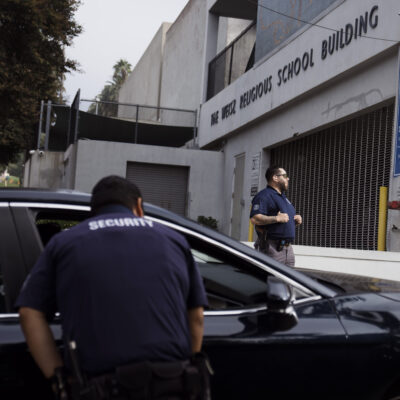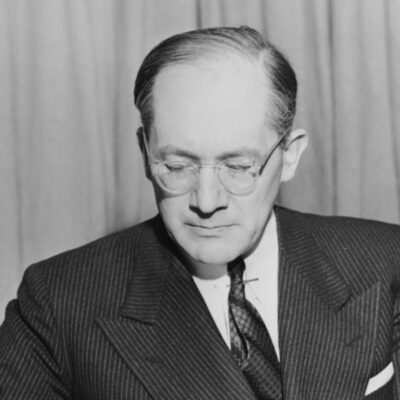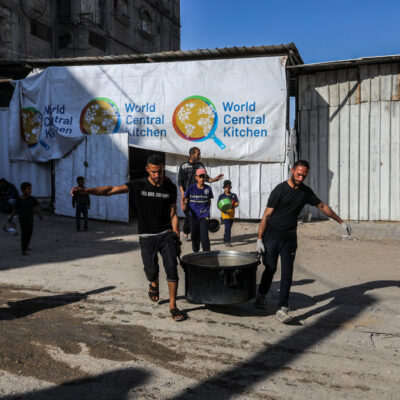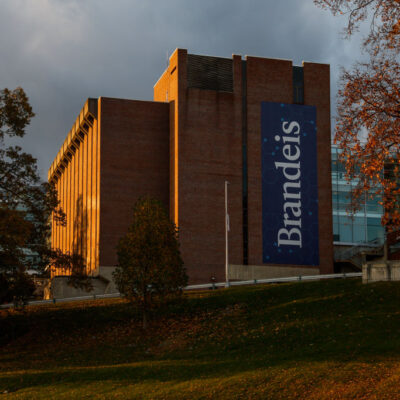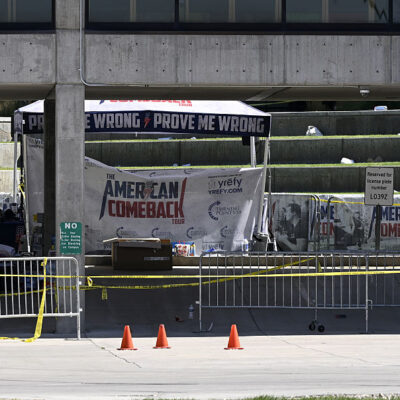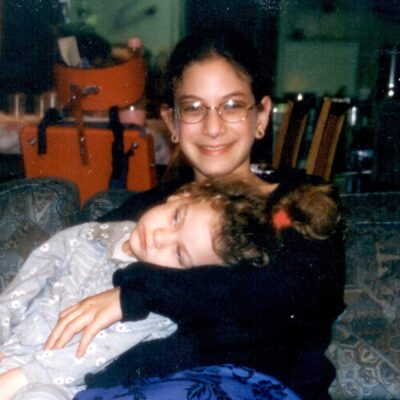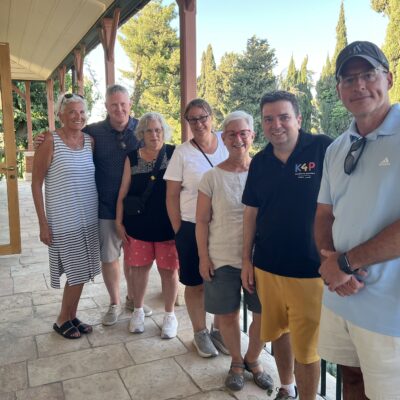Opinion
JEWISH LEADERSHIP PIPELINE
Young adults are facing new risks as Jewish leaders. Here’s how we can help support them.
In Short
With the increased personal, professional and even physical risk involved in being a proud young Jewish leader, we must ask ourselves: What do we need to do to support these young people who are accepting these risks and continuing to lead in today’s world?
When I undertook the big life transition from college student to full-time member of the workforce, I made it a priority to continue my volunteer leadership and engagement with the Jewish community. Being involved in Jewish life was (and continues to be) a key part of my continued learning, growth and leadership. Unlike the conditions we are seeing on campus today, my Jewish identity and pride were always things I could discuss publicly and freely with friends and peers, Jewish and non-Jewish. It was something I never once thought about having to conceal for risk of being verbally or physically attacked. Decades ago, my grandparents did not have the same luxury — and young adults today, sadly, do not have it either.
Two decades after my college experiences, I recognize how important they were for me. My involvement in Jewish life introduced me to so many amazing people and opportunities that helped my personal journey and contributed to the creation of Moishe House, where I continue to devote my time and energy. I can’t imagine my personal or professional life today had I not invested in building Jewish and civic life in my local community as a young adult forging my way into my 20s.

Participants celebrate Shabbat at a Moishe House retreat in March 2024 in Inverness, Calif. Courtesy/Moishe House
Since Oct. 7, there has been a dramatic shift in how Jewish young adults can lead in the world. Conversations with young Jewish professionals around the globe make it clear that there is now a risk of openly and proudly identifying as a Jewish leader. A climate of risk — personal, professional and even potentially physical — also exists for early-career young Jewish adults who celebrate their Judaism and connection to Israel. Even before the encampments on campuses, we saw:
- a Moishe House community in the United Kingdom take down their mezuzah because they felt unsafe;
- a Moishe House resident in her pediatrics residency get reported to HR by a coworker for supporting genocide, based on the pro-Israel content on her social media accounts; and
- a career counselor recommend that a Moishe House resident remove the Jewish volunteer experiences from his resume to open up more summer job opportunities as a law student.
This is not OK and it is not the future we want for our kids. These young adults should be celebrated for dedicating time and resources to building their Jewish community — and their community at large — and taking on leadership roles. With this increased personal, professional and even potentially physical risk involved in being a proud young Jewish leader, we must ask ourselves: What do we need to do to support these young people who are accepting these risks and continuing to lead in today’s world? In a post-Oct. 7 world, young Jewish adults must balance their professional ambitions and build their social lives while knowing that proudly proclaiming their Jewish identities will likely have negative social and professional consequences. What are we, Jewish communal professionals and lay leaders, going to do about this?
We need to have a plan. We need to build new strategies for lifting up young Jewish adults, and we must recommit ourselves to investing in young Jewish adults in their 20s and 30s.
I have a few thoughts about how the Jewish world can respond to this moment:
Invest in more Jewish spaces where young Jews can be Jewish to recharge their batteries and build their networks
While we have thankfully moved on from the heightened physical isolation of the COVID-19 pandemic, we are still battling a devastating loneliness epidemic here in America. In a recent advisory, U.S. Surgeon General Dr. Vivek Murthy noted that over the past two decades, young people’s face-time with other people has declined by 50%. These are the students in our classrooms, campers in our bunks, organizers and attendees of young professionals events, people who work with us professionally on Jewish communal projects — and they are lonely. They might not have the language to express that, but they feel it. While remote work and hybrid schedules have many upsides, they also create more time alone and without new friends, colleagues and ideas.
As we simultaneously battle the loneliness epidemic and rising antisemitism, we need more opportunities and environments where young Jewish adults can be in community. Whether it’s through retreats, living with friends as roommates, volunteer opportunities, classes or Shabbat meals, providing more Jewish spaces to come together will help young Jewish adults feel connected to a community, more comfortable in their own skin and secure in their Jewish identities.
Create more opportunities for intergenerational mentorship, networking and support
We need opportunities and experiences for Jews in their 20s and 30s to build relationships with established professionals and leaders to help overcome the new professional growth challenges presenting themselves as they enter the workforce. The Jewish community is filled with professionals with diverse skill sets and career experiences. We need to invite experienced professionals into places where young Jewish adults are already spending their time to help with career guidance, mentorship and coaching.
Additionally, we need to show appreciation for young leaders, knowing that they have something to lose through their Jewish leadership. We need to acknowledge and increase our support of the talented and daring Jewish young people who are proudly serving as Jewish voices among their peers. They deserve our support, training, networks, mentorship and pathways to continued development. We must overcompensate for how challenging and isolating it is for them post-Oct. 7.
We need to use our Jewish tradition and rabbinic support to lift up and hold young leaders
This is not the first time that antisemitism has been on the rise. We have Jewish wisdom and rabbinic leadership that can provide comfort, support and guidance during these difficult times. We must invest in those relationships.
Since Oct. 7, our team at Moishe House has seen a dramatic increase in the number of young adults starting relationships with Base rabbis. In times of societal turbulence, young people crave the wisdom, knowledge and comfort of rabbinic leaders. Yes, young adults are not yet shul joiners, but they still value rabbinic leadership. We need to support, sustain and, in some cases, create opportunities where rabbis can provide pastoral care in a way that connects with Gen-Z and older millennial Jews. Jewish learning, Jewish conversations and rabbinic relationships matter, and we must fuel more of it.
Build more relationships between young Israelis and the Diaspora
Feeling alone together is a lot better than feeling alone by yourself. We need to build more relationships between Israeli young adults and diaspora young adults. For many of us that grew up with friends and relatives living in Israel, we had a natural connection to both Israel and Israelis. While we have strong investments in the country through programs like Birthright Israel and RootOne, we also must invest in the relationships with Israelis. We’ve seen this work through camps and on campus and now it is time to further that investment to the 20s and 30s demographic. For us, this means investing in Moishe Houses around the world with Israeli residents, food and culture; ensuring we have young Israeli leaders in leadership roles for all our larger gatherings; sending our Jewish educators to Israel to learn and connect; providing more incentive grants for Israeli programming; and investing in The Four Hatikvah Questions to support young leaders with education and resources for Israel programming around the globe.
But there is still more we can do, and we need to uncover new approaches.
The global Jewish people are facing one of our toughest moments in decades. Israel is at war. Antisemitism is rising. Loneliness is rampant. Jewish young adults are in the thick of this, fighting for Israel against Hamas, advocating for Israel abroad and helping communities navigate this crisis wherever they are in the world. As Jewish communal professionals and lay leaders, we cannot solve all of their problems, but we can position them to thrive and succeed in the face of these challenges by doing what we do best — giving them the tools they need to build rich and meaningful Jewish lives.
David Cygielman is the founder and CEO of Moishe House.

 Add EJP on Google
Add EJP on Google